
In Greco-Roman mythology, Aeneas was a Trojan hero, the son of the Trojan prince Anchises and the Greek goddess Aphrodite. His father was a first cousin of King Priam of Troy, making Aeneas a second cousin to Priam's children. He is a minor character in Greek mythology and is mentioned in Homer's Iliad. Aeneas receives full treatment in Roman mythology, most extensively in Virgil's Aeneid, where he is cast as an ancestor of Romulus and Remus. He became the first true hero of Rome. Snorri Sturluson identifies him with the Norse god Víðarr of the Æsir.
In Greek mythology, Aeolus or Aiolos is a name shared by three mythical characters. These three personages are often difficult to tell apart, and even the ancient mythographers appear to have been perplexed about which Aeolus was which. Diodorus Siculus made an attempt to define each of these three, and his opinion is followed here.
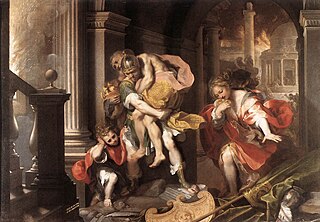
The Aeneid is a Latin epic poem that tells the legendary story of Aeneas, a Trojan who fled the fall of Troy and travelled to Italy, where he became the ancestor of the Romans. Written by the Roman poet Virgil between 29 and 19 BC, the Aeneid comprises 9,896 lines in dactylic hexameter. The first six of the poem's twelve books tell the story of Aeneas' wanderings from Troy to Italy, and the poem's second half tells of the Trojans' ultimately victorious war upon the Latins, under whose name Aeneas and his Trojan followers are destined to be subsumed.
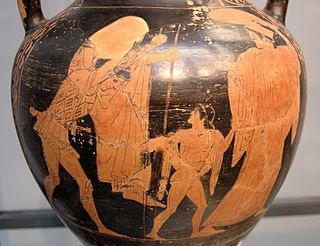
Ascanius was a legendary king of Alba Longa and is the son of the Trojan hero Aeneas and Creusa, daughter of Priam. He is a character in Roman mythology, and has a divine lineage, being the son of Aeneas, who is the son of the goddess Venus and the hero Anchises, a relative of the king Priam; thus Ascanius has divine ascendents by both parents, being descendants of god Jupiter and Dardanus. He is also an ancestor of Romulus, Remus and the Gens Julia. Together with his father, he is a major character in Virgil's Aeneid, and he is depicted as one of the founders of the Roman race.
In Greek mythology, Theona or Theano was the wife of Amycus by whom she gave birth to her son, Mimas on the same night queen Hecabe's son Paris was born. Mimas was killed in exile, fighting alongside Aeneas in Italy, by Mezentius, king of the Etruscans.
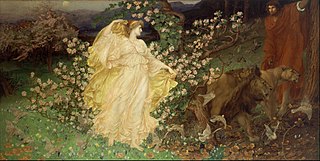
In Greek and Roman mythology, Anchises was a member of the royal family of Troy. He was said to have been the son of King Capys of Dardania and Themiste, daughter of Ilus, who was son of Tros. He is most famous as the father of Aeneas and for his treatment in Virgil's Aeneid. Anchises' brother was Acoetes, father of the priest Laocoön.
In Greek mythology, Deiphobus was a son of Priam and Hecuba. He was a prince of Troy, and the greatest of Priam's sons after Hector and Paris. Deiphobus killed four men of fame in the Trojan War.
In Greek mythology, the name Halaesus or Halesus may refer to:
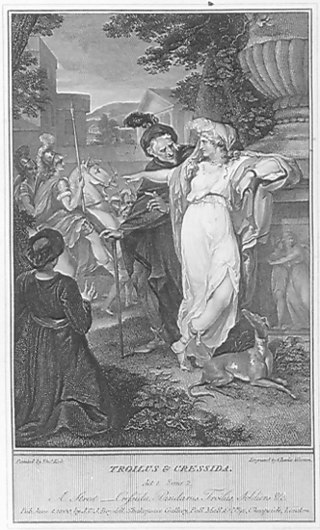
Pandarus or Pandar is a Trojan aristocrat who appears in stories about the Trojan War.
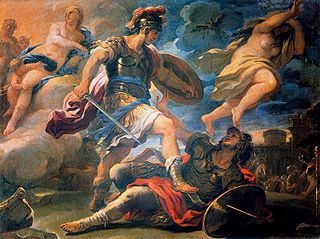
Turnus was the legendary King of the Rutuli in Roman history, and the chief antagonist of the hero Aeneas in Virgil's Aeneid.
According to Roman mythology, Amata was the wife of Latinus, king of the Latins, and the mother of their only child, Lavinia. In the Aeneid of Virgil, she commits suicide during the conflict between Aeneas and Turnus over which of them would marry Lavinia.
Clytius, also spelled Klythios, Klytios, Clytios, and Klytius, is the name of multiple people in Greek mythology:
The Rutuli or Rutulians were an ancient people in Italy. The Rutuli were located in a territory whose capital was the ancient town of Ardea, located about 35 km southeast of Rome.
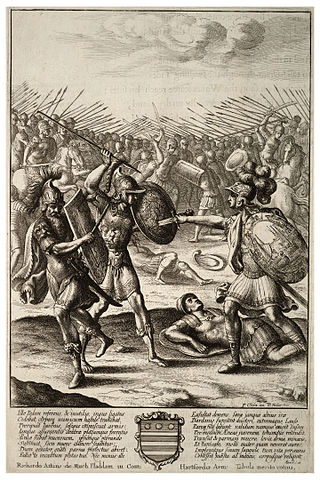
Lausus was the son of the ousted Etruscan king Mezentius, and fought with him against Aeneas and the Trojans in Italy. He appears in Virgil's Aeneid in Books VII and X. When his father is wounded by Aeneas, Lausus steps in between them, and Aeneas strikes them down. In doing so, Lausus embodies the idea of pietas that Virgil praises throughout, exemplified in the relationships of Anchises and Aeneas and of Pallas and Evander. Aeneas immediately feels remorse for having killed the boy, and reproaches Lausus' men for keeping a distance rather than caring for the body: "Then to the stripling's tardy followers / he sternly called, and lifted from the earth / with his own hand the fallen foe: dark blood / defiled those princely tresses braided fair."

The kings of Alba Longa, or Alban kings, were a series of legendary kings of Latium, who ruled from the ancient city of Alba Longa. In the mythic tradition of ancient Rome, they fill the 400-year gap between the settlement of Aeneas in Italy and the founding of the city of Rome by Romulus. It was this line of descent to which the Julii claimed kinship. The traditional line of the Alban kings ends with Numitor, the grandfather of Romulus and Remus. One later king, Gaius Cluilius, is mentioned by Roman historians, although his relation to the original line, if any, is unknown; and after his death, a few generations after the time of Romulus, the city was destroyed by Tullus Hostilius, the third King of Rome, and its population transferred to Alba's daughter city.

In Roman mythology, Pallas was the son of King Evander. In Virgil's Aeneid, Evander allows Pallas to fight against the Rutuli with Aeneas, who takes him and treats him like his own son Ascanius. In battle, Pallas proves he is a warrior, killing many Rutulians. Pallas is often compared to the Rutulian Lausus, son of Mezentius, who also dies young in battle. Tragically, however, Pallas is eventually killed by Turnus, who takes his sword-belt, which is decorated with the scene of the fifty slaughtered bridegrooms, as a spoil. Throughout the rest of Book X, Aeneas is filled with rage (furor) at the death of the youth, and he rushes through the Latin lines and mercilessly kills his way to Turnus. Turnus, however, is lured away by Juno so that he might be spared, and Aeneas kills Lausus, instead, which he instantly regrets.

Tiberinus is a figure in Roman mythology. He was the god of the Tiber River. He was added to the 3,000 rivers, as the genius of the Tiber.

In Greek and Roman mythology, Nisus and Euryalus are a pair of friends serving under Aeneas in the Aeneid, the Augustan epic by Virgil. Their foray among the enemy, narrated in book nine, demonstrates their stealth and prowess as warriors, but ends as a tragedy: the loot Euryalus acquires attracts attention, and the two die together. Virgil presents their deaths as a loss of admirable loyalty and valor. They also appear in Book 5, during the funeral games of Anchises, where Virgil takes note of their amor pius, a love that exhibits the pietas that is Aeneas's own distinguishing virtue.

Messapus, a character in Virgil's Aeneid, appears in Books VII to XII of the Latin epic poem. He was a son of Neptune, a famous tamer of horses, and king of Etruria, known for being one "whom no one can fell by fire or steel".

Corynaeus is the name of one or more characters in Virgil's Aeneid (29–19 BCE). The first mention of Corynaeus in the poem is as a Trojan follower of Aeneas, who performs funerary rites for Misenus. Characters of the same name are then specified both as being killed by an archer, and later fighting in the final battle. This apparent contradiction is often explained by defining these as two separate characters.














